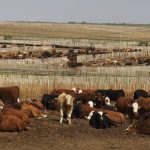Chicago Mercantile Exchange cattle futures turned lower on Friday on technical trading, month-end positioning and ongoing concerns that high retail beef prices could chill consumer demand later this summer, traders said.


Flooding in Midwest provides some support for hogs as roads, rail lines washed out around processors








